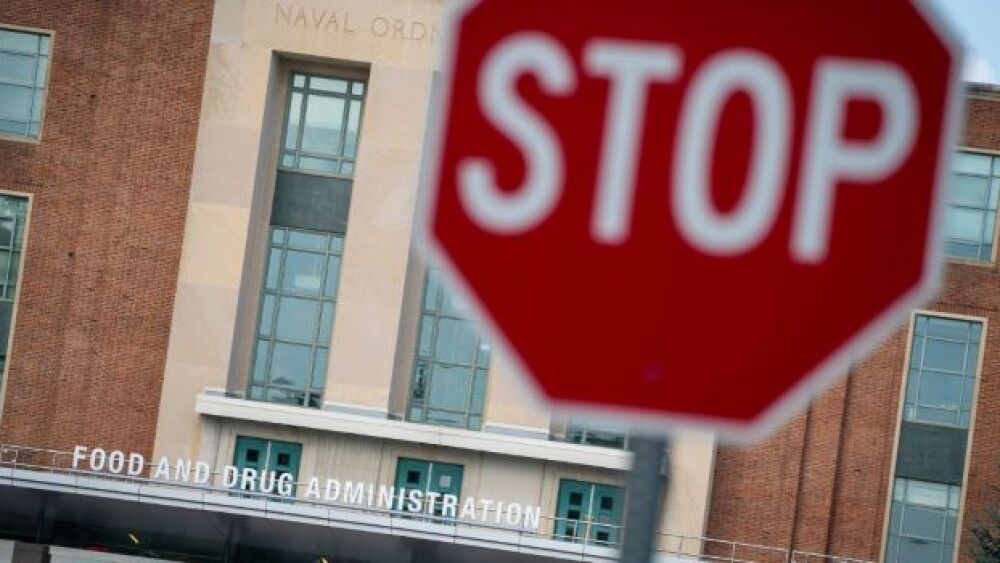ARS Pharmaceuticals, Intarcia Therapeutics and Taysha Gene Therapies this week got stark reminders of the difficulties in getting treatments through the regulator’s approval process.
Pictured: Stop sign in front of FDA headquarters/Sarah Silbiger/Getty Images
Several companies this week got stark reminders that the FDA’s regulatory gauntlet is difficult to navigate in terms of getting treatments approved. Though it received backing from the Pulmonary-Allergy Drugs Advisory Committee in May, the FDA on Tuesday rejected ARS Pharmaceuticals’ neffy as a nasal spray for allergic reactions—a reminder that the regulator doesn’t have to follow the advice of its advisory committees. ARS plans to file a Formal Dispute Resolution Request appealing the FDA’s Complete Response Letter (CRL).
On Thursday, the FDA’s Endocrinologic and Metabolic Drugs Advisory Committee voted 19-0 against Intarcia Therapeutics’ ITCA 650 implantable drug-device combination for the treatment of type 2 diabetes. The advisory committee defeat is the latest in ITCA 650’s troubled regulatory history, which has included two CRLs.
Taysha this week dropped its lead experimental gene therapy candidate for giant axonal neuropathy after the FDA reiterated the need for a randomized, double-blind, placebo-controlled trial. Adding insult to injury, in Tuesday’s announcement Taysha reported that Astellas will not be exercising its option to obtain an exclusive license to the therapy.
After facing regulatory roadblocks, BeiGene reported this week that Novartis returned the former’s anti-PD-1 antibody, with the cancer-focused biotech regaining worldwide rights to develop, manufacture and commercialize tislelizumab. In a separate announcement, BeiGene announced that the FDA accepted for review a Biologics License Application for tislelizumab as a first-line treatment for patients with unresectable, recurrent, locally advanced or metastatic esophageal squamous cell carcinoma.
Other companies seem to have learned from their regulatory setbacks and have course corrected. Bouncing back from two CRLs, Alvotech saw its Biologics License Application for Humira biosimilar AVT02 accepted by the regulator with a target action date of Feb. 24, 2024. And, following a Type A meeting with the FDA, Mesoblast this week said it now has clarity about the next steps in demonstrating the effectiveness of its twice-rejected cell therapy in acute graft-versus-host disease.
Seven months after it won accelerated approval, Travere Therapeutics this week came up short on a confirmatory Phase III study for its kidney disease drug sparsentan, which narrowly missed a key endpoint. Travere now says it will meet with regulators and expects to submit a supplemental New Drug Application in the first half of 2024 for full approval. The company’s shares plummeted more than 40% following the news.
However, progress was made in several late-stage cancer trials this week. Merck, Seagen and Astellas—which are collaborating on a drug combination to treat locally advanced and metastatic urothelial cancer—announced Friday that their Phase III trial met dual primary endpoints. The same day, AstraZeneca and Daiichi Sankyo reported that their antibody-drug conjugate improved progression-free survival with a “trend in improvement” for overall survival in a late-stage breast cancer study—as they look to challenge Gilead’s Trodelvy.
Finally, in honor of World Cancer Research Day (Sept. 24), BioSpace this week took a deep dive into 10 therapeutic candidates with the potential to change the treatment landscape for lung, breast, colorectal and other cancers.
Greg Slabodkin is the News Editor at BioSpace. You can reach him at greg.slabodkin@biospace.com. Follow him on LinkedIn.






